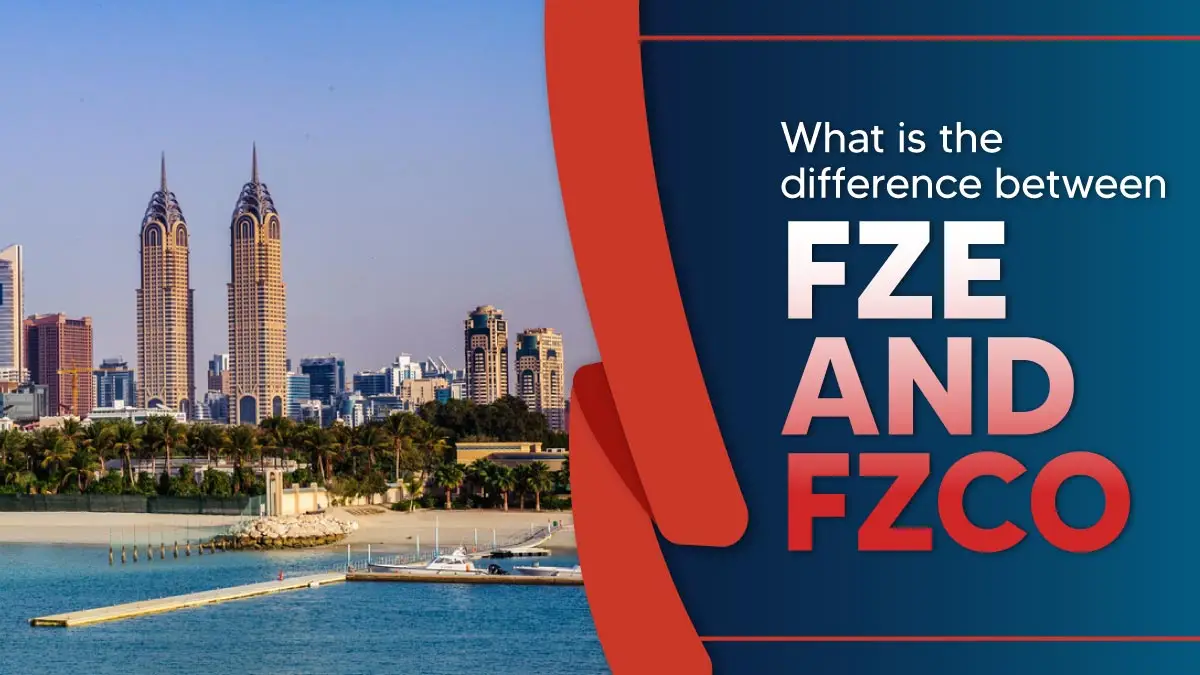Starting your business in Dubai can be a bit over for you, especially when faced with the complexities of company structures like FZE (Free Zone Establishment) and FZCO (Free Zone Company). Suppose you find yourself scratching your head over these terms. You’re not alone in that case—many budding business owners share your confusion. The difference between FZE and FZC are mentioned in the same guide.
Thankfully, Shuraa Business Setup is ready to guide you through the maze of options. With their personalised assistance, Shuraa simplifies the process, helping you make sense of the differences and confidently select the proper structure for your business. Trust in Shuraa’s expertise to navigate the nuances, ensuring your business flourishes in the vibrant landscape of the UAE.
Business Entities in Dubai
Here are the various business entities available for setting up a business in Dubai:
Sole Proprietorship
- 100% ownership by one individual.
- Complete control and unlimited liability for debts and obligations.
- Suitable for professionals like consultants.
- Foreign nationals can own a professional sole proprietorship but require a Local Service Agent (LSA).
Limited Liability Company (LLC)
- Most popular onshore business structure.
- Requires a local sponsor holding at least 100% of the shares in certain activities.
- Liability is restricted to the extent of each shareholder’s individual holdings.
Free Zone Companies
- Located within designated free zones.
- Offer 100% foreign ownership, tax exemptions, and full repatriation of profits.
- Suitable for businesses looking to trade internationally.
- No requirement for a local sponsor.
Offshore Companies
- Mainly employed for international trade and safeguarding assets.
- 100% foreign ownership.
- There is no need for a physical presence in the UAE.
- Cannot conduct business within the UAE.
Choosing the right business entity in Dubai involves considering ownership preferences, liability concerns, capital requirements, and business activity. Consulting with Shuraa Business Setup professionals can help ensure compliance and a smooth business setup.
Understanding a Free Zone Establishment (FZE)
FZE Meaning?
A Free Zone Establishment (FZE) business entity can be set up in one of Dubai’s designated free zones. It offers several advantages, particularly for foreign investors. An FZE allows 100% foreign ownership, meaning the investor does not need a local partner or sponsor. The entity is limited to a single shareholder, an individual or a corporate entity. This shareholder has limited liability, meaning their financial risk is restricted to the amount of capital invested in the business.
Streamlined Governance and Operational Efficiency
Within a Free Zone Establishment (FZE) framework, the singular ownership structure offers a clear pathway to easily managing and directing the company’s affairs. This streamlined approach fosters agility in decision-making and operational management. However, any alterations to share ownership necessitate formal approval from Free Zone authorities, ensuring adherence to regulatory standards.
Regulatory Framework and Compliance Obligations
Governance within FZEs is governed by stringent regulations outlined in the FZE Implementing Rules and Regulations, established by the respective Free Zones. These rules require a minimum of two directors and a company secretary, which can be merged into one role. To commence operations legally, FZEs must obtain a Free Zone License. Additionally, they must submit audited financial statements to the Free Zone Authority annually within three months following the conclusion of the fiscal year. This requirement promotes transparency and upholds financial accountability within the FZE ecosystem.
Defining a Free Zone Companies (FZC)?
An FZC is a distinct business entity allowing up to five shareholders, setting it apart from an FZE. Its nomenclature typically mirrors its shareholder composition.
Key Attributes of an FZC
Shareholders within an FZC retain the flexibility to determine the distribution of shares according to their preferences. They can opt to manage the company themselves or designate a manager. Some free zones offer tailored packages for FZCs, with fees varying based on the number of shareholders.
Shareholder Criteria and Alternatives
Establishing an FZC necessitates the active involvement of all shareholders in the documentation and signing processes. Unlike mainland LLCs, there’s no mandatory minimum share percentage for any shareholder, enabling a share allocation aligned with the company’s strategic goals.
Company Governance and Operations
Shareholders of an FZC can assume management responsibilities or appoint an external manager, depending on expertise and operational needs. Establishment costs for an FZC may vary among Free Zones, with some imposing higher charges for companies with multiple shareholders.
Key Difference Between FZE and FZC
The Key differences between FZE and FZC are as follows:
| Key Differences | Free Zone Establishment (FZE) | Free Zone Company (FZCO) |
|---|---|---|
| Number of Shareholders | Designed for a sole shareholder | Can have between two and five shareholders |
| Capital Requirements | Initial capital investment varies from $55,000 to $328,000 | Initial capital investment varies from $55,000 to $328,000 |
| Liability and Legal Status | Both provide limited liability protection | Both provide limited liability protection |
| Share Transfers | Approval is required from Free Zone authorities | Approval is required from Free Zone authorities |
| Business Operations | Governed by Free Zone regulations | Governed by Free Zone regulations |
| Director and Secretary | At least two directors and a company secretary | At least two directors and a company secretary, one person can fulfil both roles |
| Financial Statements | Timely submission of audited financial statements is required | Timely submission of audited financial statements is required |
Selecting the Optimal Business Entity for Your Business
Choosing the right entity for your business involves several considerations. Firstly, assessing your business needs and goals is crucial. This includes determining whether you prefer complete ownership, which Free Zones allow for expatriates, or if you’re comfortable with the regulations on the mainland. Your decision between incorporating as an FZE or an FZC should align with the scale of your venture and your ambitions.
It’s crucial to grasp your chosen business structure’s tax and legal implications. In Free Zones, corporate shareholders can distribute ownership stakes as desired, unlike mainland entities that face more stringent regulations. While this flexibility can aid in strategic planning and tax management, ensuring unanimity among shareholders for important decisions is imperative.
Furthermore, carefully navigating the setup and registration procedures is essential. These processes are shaped by the type of entity and the regulations specific to the chosen Free Zone. Some Free Zones may specify the acceptable range of shareholders for different company formation packages, which can impact the cost structure. It is crucial to reach a consensus on investment amounts and the managerial framework, whether opting for a professional manager or assuming direct management duties. Active participation in governance is vital for ensuring the success of your business venture.
Choosing Between FZE and FZC: Reflecting on Your Options
Selecting between a Free Zone Establishment (FZE) and a Free Zone Company (FZC) is pivotal for laying the foundation and nurturing the growth of your business in Dubai’s vibrant economy. Whether you lean towards the autonomy of an FZE or the collaborative framework of an FZC, both entities are meticulously crafted to align with your business goals, offering strategic location advantages, financial incentives, and a simplified regulatory landscape. Your decision should seamlessly integrate with your business model, management style, and financial capacity.
By thoroughly understanding the legal frameworks, operational dynamics, and financial commitments associated with each type of free zone company, investors can confidently navigate Dubai’s economic terrain. Leveraging the unique benefits each free zone offers ensures that your business remains compliant with local regulations and well-positioned for success in the global marketplace. For personalised assistance and guidance, please contact us at +97144081900 or send a WhatsApp message to +971507775554. Alternatively, you can contact us via email at [email protected] for prompt support.
FAQs
Q1. What is the difference between FZ LLC vs FZCO?
FZ LLC encompasses FZE and FZCO types but differs in shareholder numbers. FZCO requires a minimum of two shareholders, while FZE can have only one.
Q2. What is the meaning of FZE and FZCO?
FZE stands for Free Zone Establishment and allows one shareholder, while FZCO stands for Free Zone Company and permits between two to fifty shareholders.
Q3. What factors should be considered when choosing between an FZE and an FZC?
When choosing between an FZE and an FZC, factors to consider include:
- The number of shareholders you plan to have in your company.
- Your preference for operational control and decision-making within the company.
- The specific regulations and requirements of the free zone where you plan to establish your business.
- Your long-term business goals and objectives.
Q4. What are the regulatory and compliance obligations for setting up an FZE or FZC in Dubai?
Regulatory and compliance obligations associated with setting up an FZE or an FZC in Dubai include:
- Obtaining the necessary licenses and permits from the relevant authorities.
- Adhering to the corporate governance requirements set forth by the free zone authority.
- Complying with annual reporting and auditing requirements, including the submission of financial statements.
- Ensuring compliance with local laws and regulations related to business activities and operations.







